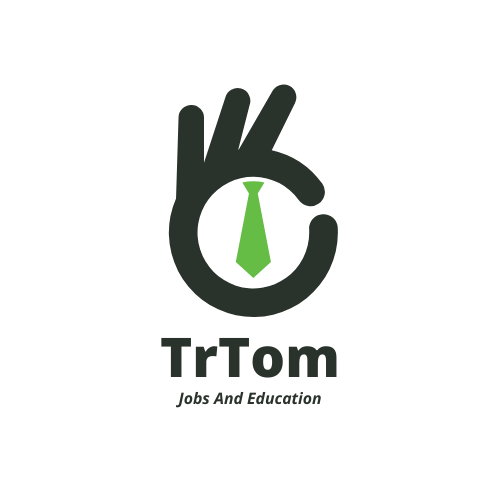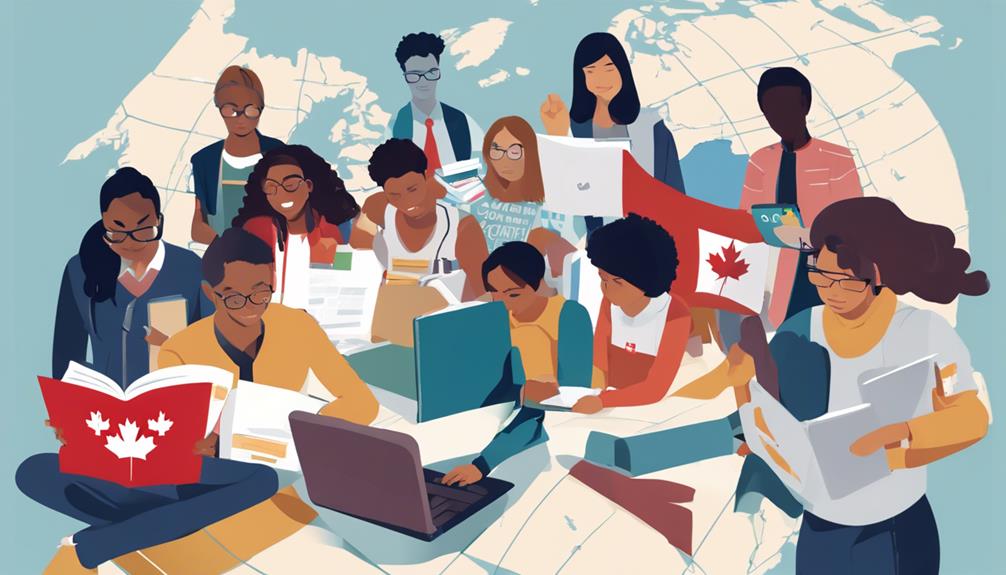Imagine Sarah, a Syrian refugee with a passion for mathematics, maneuvering the complex process of applying for scholarships in Canada. Understanding the unique challenges faced by globally displaced students, especially in accessing higher education opportunities, is vital. As you begin your scholarship journey, knowing where to find reliable resources and support can make a significant difference in your quest for financial assistance. The following steps will guide you through the application process, ensuring you are well-equipped to compete for scholarships tailored to your needs and aspirations.
Key Takeaways
- Provide proof of being a globally displaced individual.
- Maintain a strong academic record with minimum GPA.
- Demonstrate financial need clearly.
- Research diverse scholarship opportunities beyond traditional programs.
- Submit all required documents accurately and on time.
Eligibility Criteria
To be considered for scholarships for globally displaced students in Canada, meeting specific eligibility criteria is essential. First and foremost, you must have proof of being a globally displaced individual, which could include being a refugee, asylee, or stateless person.
Additionally, most scholarships require applicants to have a strong academic record, typically maintaining a minimum GPA set by the scholarship provider. In addition, demonstrating financial need is often a critical component of eligibility. This could involve submitting documentation outlining your financial situation and explaining why you require financial assistance to pursue your studies.
Moreover, some scholarships may have specific requirements based on the field of study or level of education, so ensure you carefully review the eligibility criteria for each scholarship you’re considering. Lastly, meeting deadlines for submission is paramount. Make sure you submit all required documents and applications within the specified timeframe to be considered for these invaluable opportunities.
Research Scholarship Opportunities
When exploring scholarship opportunities for globally displaced students in Canada, your next step is to thoroughly research available options that align with your academic goals and financial needs. Conducting detailed research will help you identify scholarships that best suit your specific circumstances. Here are some essential steps to guide you through the process:
- Explore Diverse Scholarship Sources: Look beyond traditional scholarship programs and consider organizations, universities, and foundations dedicated to supporting displaced students. These sources often offer unique opportunities tailored to your needs.
- Review Eligibility Criteria Carefully: Confirm you meet all the requirements before applying to save time and focus on scholarships where you have a higher chance of success.
- Seek Guidance from Academic Advisors: Consult with your school’s advisors to discover scholarships that are a good fit for your academic interests and achievements.
- Utilize Online Scholarship Search Engines: Use reputable scholarship search engines to filter and find scholarships that match your qualifications and background effectively.
Gather Required Documents
Start by compiling all the necessary documents that are typically required when applying for scholarships as a globally displaced student in Canada. First and foremost, you’ll need a valid form of identification, such as a passport or other government-issued ID, to verify your identity and nationality.
Additionally, gather your academic transcripts, including high school or college records, to demonstrate your academic achievements and qualifications. You may also need to provide proof of your status as a globally displaced student, such as a refugee card or asylum seeker certificate.
Furthermore, prepare letters of recommendation from teachers, professors, or employers who can attest to your character, work ethic, and potential for success. Don’t forget to include a well-crafted resume detailing your education, work experience, skills, and achievements.
Write a Strong Personal Statement
As you seek scholarships for globally displaced students in Canada, crafting a compelling personal statement will showcase your unique experiences and aspirations to potential scholarship providers. Your personal statement is an essential part of your scholarship application, allowing you to connect with the selection committee on a personal level.
Here are four key tips to help you write a strong personal statement:
- Be Authentic: Share your genuine thoughts and feelings. Let your voice shine through to create a personal connection with the readers.
- Tell Your Story: Highlight the challenges you have overcome and the lessons you have learned. Your story is what makes you unique and memorable.
- Express Your Goals: Clearly articulate your academic and career goals. Show how this scholarship will help you achieve them and make a difference in your life.
- Show Gratitude: Express appreciation for the opportunity to apply for the scholarship and convey how much it would mean to you to receive it.
Secure Strong Letters of Recommendation
To secure strong letters of recommendation for your scholarship application as a globally displaced student in Canada, strategically choose individuals who can attest to your academic achievements and character. Consider approaching teachers, professors, or mentors who’ve witnessed your dedication, work ethic, and passion for learning.
When requesting a letter of recommendation, provide the person with specific examples of your academic accomplishments, extracurricular involvement, and any challenges you have overcome. This will help them tailor the letter to highlight your strengths effectively.
It’s essential to give your recommenders ample time to write the letters, ideally at least a few weeks before the deadline. Follow up politely to make sure they’ve everything they need and to express your gratitude for their support.
Additionally, provide them with detailed information about the scholarship you’re applying for and why you believe you’re a strong candidate. By selecting the right individuals and guiding them effectively, you can secure compelling letters of recommendation that enhance your scholarship application.
Submitting Your Scholarship Application
When preparing to submit your scholarship application as a globally displaced student in Canada, make sure all required documents are meticulously organized and completed according to the guidelines provided by the scholarship committee. This step is vital in guaranteeing that your application stands out and is considered for the scholarship opportunity.
Here are some key points to keep in mind during the submission process:
- Double-Check Everything: Review your application multiple times to make certain there are no errors or missing information that could jeopardize your chances.
- Meet Deadlines: Submit your application before the deadline to avoid any last-minute technical issues that could prevent your submission from going through.
- Seek Feedback: If possible, have someone else review your application to provide feedback on areas that could be improved or strengthened.
- Stay Organized: Keep track of all submission requirements, deadlines, and communications with the scholarship committee to stay on top of the process.
Prepare for Interviews (If Applicable)
Prepare yourself for potential scholarship interviews by researching common interview questions and practicing your responses to showcase your qualifications and experiences effectively. Start by researching the typical questions asked during scholarship interviews, such as your academic achievements, extracurricular activities, career goals, and how you plan to contribute to your field of study. Understanding these common themes will help you prepare thoughtful and articulate responses.
Practice your answers in front of a mirror or with a friend to gain confidence and refine your delivery. Focus on highlighting your strengths, experiences, and unique qualities that make you a deserving candidate for the scholarship. Remember to tailor your responses to align with the values and goals of the scholarship provider.
Additionally, consider preparing questions to ask the interviewers. This action indicates your interest in the scholarship and allows you to gather valuable information about the program. Finally, make sure to dress professionally, maintain good posture, and practice active listening during the interview to leave a positive impression.
Follow Up and Persistence
After preparing for scholarship interviews, your next step is to demonstrate follow-up and persistence in your pursuit of the scholarship opportunity. Here are four essential ways to showcase your dedication and commitment to the scholarship committee:
- Timely Thank-You Notes: Send personalized thank-you emails or letters to the interviewers within 24 hours. Express your gratitude for the opportunity and reiterate your interest in the scholarship.
- Regular Follow-Ups: Don’t be afraid to reach out to the scholarship committee to inquire about the selection timeline or ask for any updates. Polite follow-up emails can demonstrate your enthusiasm for the scholarship.
- Additional Materials: If there are any extra documents or information you can provide to support your application further, be proactive in submitting them. This shows your thoroughness and willingness to go the extra mile.
- Persistence with Purpose: While being persistent, make sure your communications are respectful and purposeful. Showcase your determination without becoming a nuisance, striking a balance that highlights your strong interest in the scholarship without being overbearing.
Conclusion
Congratulations, you’ve successfully maneuvered through the intricate world of scholarships for globally displaced students in Canada. Now, all you have to do is sit back and wait for the endless rejection emails to flood your inbox.
Remember, persistence is key, so keep applying and praying for that elusive golden ticket to educational funding. Good luck, you’ll need it!

